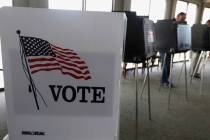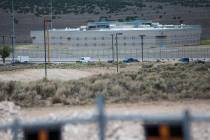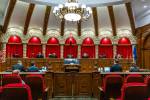Democrats pledge Legislature will take action to raise revenue
CARSON CITY — The Legislature’s top two Democrats insist they will pass tax reforms — reforms that could produce more tax revenue — before the legislative session ends June 3 and force Gov. Brian Sandoval to decide whether to veto what they believe will be fairer tax laws.
“There are 63 legislators who I believe want to pass something, and we can send something to the governor whether he passes it or not,” said Assembly Speaker Marilyn Kirkpatrick, D-North Las Vegas. “We are going to get some things out of this session.”
“I want to do something now,” added state Senate Majority Leader Mo Denis, D-Las Vegas. “There are ways to look for additional revenue without raising taxes.”
Both spoke with reporters during the first week of the 2013 legislative session. But Sandoval again Friday repeated he will veto tax increases other than continuing $649 million in business and sales taxes that would otherwise expire after June 30.
Democrats cannot pass any tax increases, or overcome the governor’s veto, without the support of at least four Republicans, and no Republicans have said they would go against the will of the governor on this issue.
Discussions on Sandoval’s plan to extend the so-called “sunset taxes” begins Tuesday in a joint meeting of the Assembly Taxation Committee and the Senate Committee on Revenue.
MAJORITY LEADER WANTS MORE
Denis emphasized Democrats want to review state spending before deciding whether higher taxes are needed to meet the needs of public education, but he admitted the so-called “revenue-neutral” tax reform might not generate enough.
Under the common definition, revenue-neutral taxes are those that do not bring in more revenue than the taxes they replace.
“If I were to guess today, I would probably say it’s not enough,” Denis said of any revenue-neutral plan.
Nevada is beginning to come out of a recession that forced legislators to reduce general fund spending in the 2009 and 2011 budgets. Sandoval is recommending a 5.5 percent increase in the 2013-15 budget, bringing spending to $6.55 billion. His budget would allocate $135 million more for public education, including adding 46 full-day kindergarten classes and spending $14 million to help students learn English.
Denis, however, contends that every elementary school needs full-day kindergarten now, not in the future. He wants to add about 100 more full-day kindergartens than Sandoval is seeking and to reduce class sizes. The speaker, however, has not put a figure yet on how much more should be spent on education.
In a speech to senators that opened the legislative session, Denis said the state needs “a fair revenue structure that meets the needs of modern-day Nevada and that doesn’t unduly burden the middle-class families (and) one that is fair and equitable to businesses.”
Sandoval said he does not mind tax reform discussions, but he cannot comment on any Democratic proposals because none have yet surfaced in the Legislature.
Senate Minority Leader Michael Roberson, R-Las Vegas, indicated to Review-Journal columnist Steve Sebelius that he might support revenue-neutral taxes, but the governor’s chief of staff, Gerald Gardner, earlier questioned whether a true revenue-neutral tax could be developed since some people would pay more and others less.
KIRKPATRICK HINTS AT TAX HIKES
Kirkpatrick hinted at tax increases, noting thousands of Nevadans signed the Nevada State Education Association petition calling for a 2 percent business margins tax to raise $800 million a year for public schools. Legislators must decide by March 15 whether to support the tax. If they don’t, then the proposal goes before voters in the 2014 election.
“We can’t wait that long for tax structure changes,” Kirkpatrick said. “I believe 149,000 people (petition signers) said education is important and, ‘Please do what you can to fund it now,’ and I believe we will.”
At the 2011 session, Kirkpatrick chaired the Taxation Committee that held many hearings on a proposed .08 percent business margins tax, a tax that went nowhere because of Republican opposition and what she called “technical problems in its implementation.”
One problem was the need for the Department of Taxation to set up procedures and hire employees to collect the tax.
That bill also called for eliminating the 1.17 percent Modified Business Tax, a tax on payroll, a goal that teachers association President Lynne Warne shares if her petition becomes law.
Asked whether she supports placing an alternative tax plan to the teachers union’s petition before voters, Kirkpatrick said only that it is the Legislature’s job to fund education and state government.
“You can’t guess what the public will do. It’s up to the Legislature to do its job.”
ALTERNATIVE TAX TALK
Sandoval has repeatedly declined comment on whether he would sign an alternative tax proposal to counter the teachers tax petition, since no alternatives have been brought to him.
Kirkpatrick emphasized there are ways to increase revenue without raising taxes.
She repeated an anecdote about the live entertainment tax that she has been telling reporters since November. Businesses with music are supposed to pay the entertainment tax when “the music is louder than the conversation,” according to the speaker.
“There are coffee shops where music is louder than conversations,” she said. “But the definition is not very clear, and we can’t enforce the law. Many people have been getting exemptions for 10 years. It is time for them to pay. We want to be sure everyone is paying the tax.”
Although lawmakers will discuss implementing a sales tax on services such as haircuts, beauty parlor visits, accounting and advertising, Kirkpatrick said they must be “careful” before moving in that direction during the current session.
Sales taxes have been frowned upon by progressive groups because they disproportionately affect poorer people.
She said the Legislature has not taken a look at true tax reform in 10 years.
In 2003, legislators rejected a plan by Gov. Kenny Guinn to impose a 0.25 percent gross receipts tax on all purchases from businesses.
The idea was to require big box stores such as Wal-Mart to contribute more tax revenue to the state. Advocates noted that chain-store prices in Nevada were not lower than in other states, even though the Silver State had no corporate income tax.
Since that rejection, Democrats have repeatedly said that Nevada ultimately must have a “broad-based” tax on business.
“It is our responsibility to get something done this session, and that is where we are headed,” Kirkpatrick said.
Review-Journal writers Sean Whaley and Laura Myers contributed to this report. Contact Capital Bureau Chief Ed Vogel at evogel@reviewjournal.com or 775-687-3901.
TAX HEARINGS
The review of all state tax source will resume at 1 p.m. Tuesday when the Senate Revenue Committee and the Assembly Taxation Committee discuss the modified business taxes and the series of taxes that Gov. Brian Sandoval wants to extend until July 2015. Then at 1:30 p.m. Thursday, the two committees will look at gaming and live entrainment taxes. Both hearings can be watched on the legislative website at leg.state.nv.us. Click on the view meetings link on the right side of the page.























